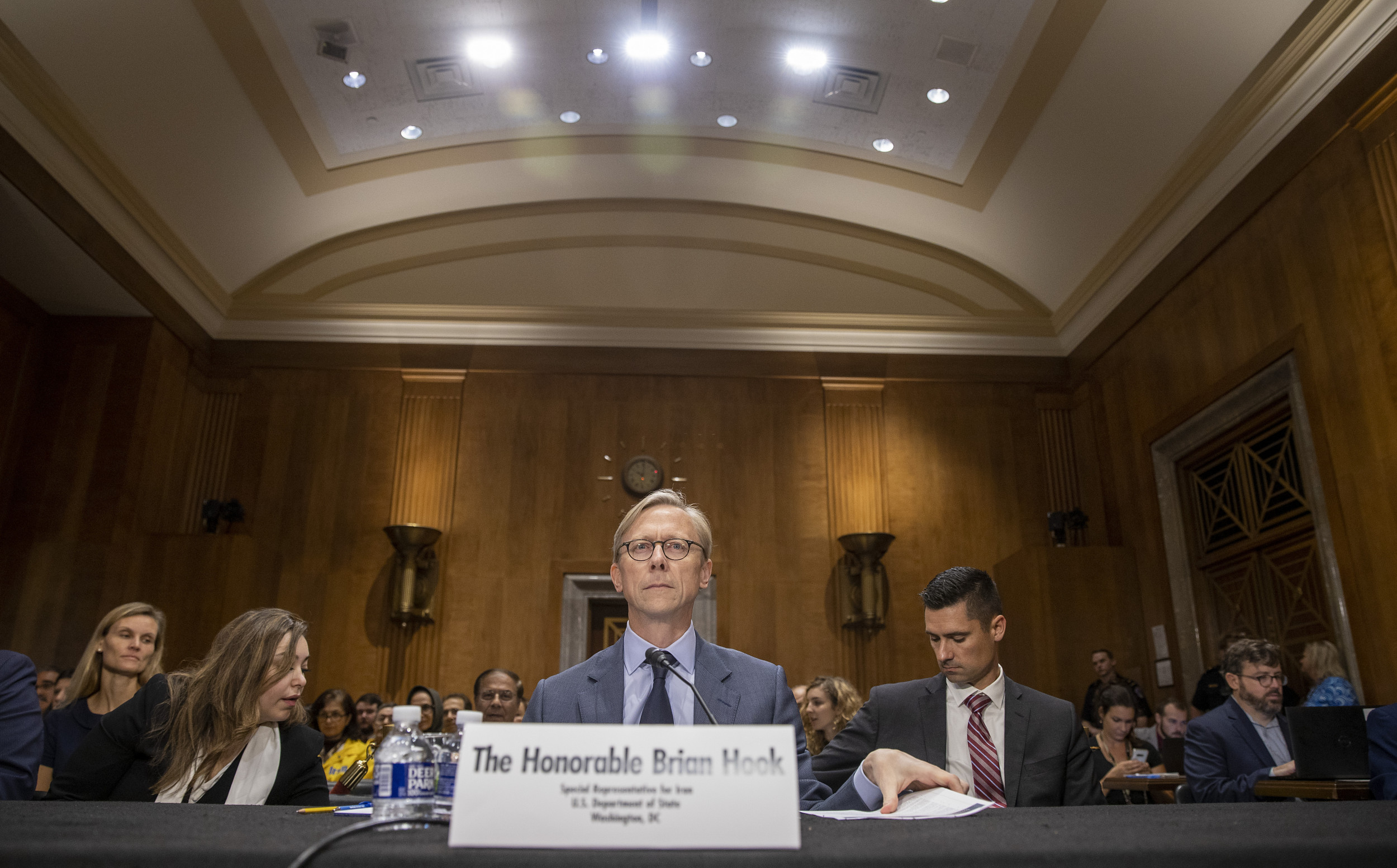特朗普政府喜欢说它“站在伊朗人民一边”,美国国务院伊朗问题首席外交官布莱恩·胡克本周重申了这一说法证据参议院外交关系委员会。然而,大量的报道表明,美国越来越严厉的制裁正在伤害普通伊朗人,并导致毒品和食物短缺。
九月下旬,就在胡克出现在录像特朗普政府概述了一系列关于美国制裁不针对人道主义物资的“事实”,对伊朗人民施加了更大的压力。奥巴马政府采取了一个深思熟虑的步骤,通过指定伊朗中央银行隶属于美国反恐机构,清除了对伊朗制裁的剩余人道主义豁免。
甚至在被指认之前,胡克关于照顾伊朗平民的说法就已经受到质疑。毕竟,尽管豁免已经到位,但它们对国际银行几乎没有保证,而国际银行也是如此可怕的因为无意中违反制裁来扰乱人道主义交易而被处以巨额罚款。风险远远超过利润。
然而,中央银行的名称似乎是故意设计的扼杀人道主义交易美国退出伊朗核协议或联合全面行动计划已经限制了与伊朗的合作。中央调查局是对与伊朗的现有人道主义贸易至关重要因为它将有限的外汇储备分配给伊朗的银行,这样他们就可以用钱来换取食品和药品等人道主义物资。
展望未来,由于新的恐怖主义名称,其中不包括人道主义豁免,涉及《生物多样性公约》的交易将是可以制裁的——即使是人道主义贸易。
这一决定可能会给伊朗人民带来灾难性的后果。特朗普政府似乎已经知道这个称号会影响人道主义贸易。财政部的发布宣布这一任命表明,政府“将继续酌情考虑与伊朗人道主义贸易有关的请求”这种人道主义交易以前获得一般许可证豁免,不需要额外授权。
自20世纪90年代联合国对伊拉克实施制裁以来,故意以援助为目标的做法一直被避免。在第一次海湾战争后,联合国对伊拉克实施了近乎封锁的制裁,并摧毁了伊拉克人民。一项联合国研究找到多达576,000名伊拉克儿童可能在波斯湾战争结束后因安理会实施的经济制裁而死亡一个石油换食品的项目被设计用来减轻人道主义的影响,为伊拉克政府支付药品和食品的费用提供了一个渠道。事实上,该倡议未能解决人道主义危机利用直到美国最终在2003年入侵伊拉克。
为了避免将来出现类似情况,国会将保护人道主义贸易纳入每一个制裁制度的法律范围。2000年《贸易制裁改革和出口促进法》具体规定,制裁不能除非涉及受反恐努力制约的实体,否则将被用于针对人道主义物品。

美国国务院伊朗问题特别代表布莱恩·胡克(Brian Hook)10月16日在华盛顿特区参议院外交关系委员会关于伊朗-美国政策的听证会上作证
为什么这一切都很重要?因为特朗普政府现在已经取消了这些例外,并正在实施一个几乎等同于90年代伊拉克式制裁的制裁制度。特朗普政府通过对伊朗中央银行等大型经济机构实施恐怖主义制裁,利用了2000年法律中的一个漏洞,蓄意针对人道主义援助。在这一行动之前,伊朗人民至少有一个渠道,无论多么小,来购买重要的基本必需品。那条大道现在已经关闭了。
因此,尽管政府声称它在为伊朗人民而战,但其日益险恶的制裁制度只会伤害最脆弱的伊朗人。德黑兰的伊朗药剂师加德泽米·阿格达姆博士,说六月,“每20个人中,我们必须告诉至少10个人,我们已经用完了他们需要的药物。”换句话说,生病的男人、女人和孩子没有重要的药物。如果唐纳德·特朗普总统的目标是帮助伊朗人民,他应该少关注制裁他们陷入贫困,而是取消一个压迫性的制裁制度,该制度无助于缓和伊朗政府的行为,只会伤害普通伊朗人。
贾迈勒·阿卜迪是伊朗全国美国理事会(NIAC)主席和NIAC行动执行主任。他曾在美国国会担任外交、移民和国防问题的政策顾问。阿卜迪为纽约时报美国有线电视新闻网,外交政策和赫芬顿邮报的博客。他是印刷、广播和电视领域的常客,包括在半岛电视台、NPR和英国广播公司新闻中露面。
瑞安·科斯特洛是伊朗全国美国委员会(NIAC)的政策主管。他发推特@RN_Costello。
这篇文章中表达的观点是作者自己的。
DON'T TELL US THE TRUMP ADMINISTRATION CARES ABOUT ORDINARY IRANIANS. IT'S STARVING THEM OF FOOD AND MEDICINE | OPINION
The Trump administration likes to say it "stands with the Iranian people," a claim that was reiterated this week by the State Department's lead diplomat on Iran—Brian Hook—in testimony before the Senate Foreign Relations Committee. Yet a deluge of reports have shown how increasingly oppressive U.S. sanctions are harming ordinary Iranians and leading to drug and food shortages.
In late September, just two months after Hook appeared in a video outlining a series of "facts" on how U.S. sanctions don't target humanitarian goods, the Trump administration squeezed the Iranian people even harder. The administration took a deliberate step to eviscerate remaining humanitarian exemptions to Iran sanctions by designating the Central Bank of Iran (CBI) under U.S. counterterrorism authorities.
Even before the designation, Hook's claims to care for Iranian civilians were already in doubt. After all, while the exemptions were in place, they provided little assurance to international banks, which were too fearful of big fines for unwittingly violating the sanctions to bother with humanitarian transactions. The risk simply outweighed the profit.
However, the designation of the CBI appears to be deliberately designed to strangle off humanitarian transactions with Iran that have already been curtailed by the U.S. withdrawal from the Iran nuclear deal, or Joint Comprehensive Plan of Action. The CBI is vital for existing humanitarian trade with Iran, as it allocates limited foreign reserves to Iranian banks so that they can make payments in exchange for humanitarian goods like food and medicine.
Moving forward, transactions involving the CBI will be sanctionable—even for humanitarian trade—thanks to the new terrorism designation, which does not include a humanitarian exemption.
This decision could have disastrous results for the Iranian people. And the Trump administration appears to have known that the designation would impact humanitarian trade. The Treasury Department's release announcing the designation notes that the administration "will continue to consider requests related to humanitarian trade with Iran as appropriate." Such humanitarian transactions were previously exempted by a general license and did not require additional authorization.
The deliberate targeting of aid has been avoided since the U.N. sanctions on Iraq in the 1990s, which created a near blockade of the country and devastated the Iraqi people in the wake of the first Gulf War. A United Nations study found that as many as "576,000 Iraqi children may have died since the end of the Persian Gulf war because of economic sanctions imposed by the Security Council." An oil-for-food program was then designed to soften the humanitarian impact, providing an outlet for the Iraqi government to pay for medicine and food. In actuality, the initiative failed to solve the humanitarian crisis and was exploited by the Iraqi government to enrich and entrench Saddam Hussein and his cronies until the U.S. ultimately invaded Iraq in 2003.
To avoid similar situations in the future, Congress enshrined into law carve-outs to protect humanitarian trade within every sanctions regime. The Trade Sanctions Reform and Export Enhancements Act of 2000 specifically states that sanctions cannot be used to target humanitarian goods unless they involve entities subject to counterterrorism efforts.

Brian Hook, the State Department's special representative for Iran, testifies during the Senate Foreign Relations Committee hearing on Iran-U.S. policy on October 16 in Washington, D.C.
Why does all this matter? Because the Trump administration has now eviscerated these carve-outs and is imposing a sanctions regime that is now almost identical to the '90s Iraq-style sanctions. By implementing terrorism sanctions on a massive economic institution like the Central Bank of Iran, the Trump administration has exploited a loophole in the 2000 law to deliberately target humanitarian aid. Prior to this move, the Iranian people at least had an avenue, however small, to procure vital basic necessities. That avenue has now been shut.
So, despite claims by the administration that it is fighting for the Iranian people, its increasingly sinister sanctions regime will do nothing but harm the most vulnerable Iranians. Dr. Ghader Daemi Aghdam, an Iranian pharmacist in Tehran, said in June that "out of every 20 people, we have to tell at least 10 that we have run out of medications they need." In other words, sick men, women and children are going without vital medicine. If President Donald Trump's goal is to help the Iranian people, he should focus less on sanctioning them into destitution and, instead, remove an oppressive sanctions regime that has done nothing to moderate the Iranian government's behavior and has only harmed ordinary Iranians.
Jamal Abdi is president of the National Iranian American Council (NIAC) and the executive director of NIAC Action. He formerly served as policy adviser on foreign affairs, immigration and defense issues in the U.S. Congress. Abdi has written for The New York Times, CNN, Foreign Policy and blogs at The Huffington Post. He is a frequent guest contributor in print, radio and television, including appearances on Al Jazeera, NPR and BBC News.
Ryan Costello is policy director at the National Iranian American Council (NIAC). He tweets @RN_Costello.
The views expressed in this article are the writers' own.






